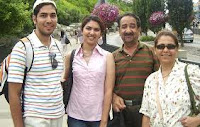 |
| Rasouli Family |
The Euthanasia Prevention Coalition intervened in the Rasouli case at the Ontario Court of Appeal. We argued that doctors are required to obtain consent before withdrawing life-sustaining treatment, and when a disagreement occurs between the family and the doctors, both parties have the right to have their case brought before the Consent and Capacity board. Link to an article on the case.
The article weighs towards favouring the position of the doctors in the way it says that Mr. Rasouli is utterly unaware, which his wife, a doctor, firmly disputes. The article also denies that this is an issue of consent to treatment when in fact this issue is clearly about who has the right to decide.
The article weighs towards favouring the position of the doctors in the way it says that Mr. Rasouli is utterly unaware, which his wife, a doctor, firmly disputes. The article also denies that this is an issue of consent to treatment when in fact this issue is clearly about who has the right to decide.
The article in the Globe and Mail was published yesterday under the title: Supreme Court asked to hear end-of-life case. The article stated:
For 13 months, Hassan Rasouli has been in a critical care unit at a Toronto hospital, where machines do all the things his body cannot: breathe, feed and hydrate him.
The 60-year-old is in a permanent vegetative state, utterly unaware he is in the middle of a divisive debate that could reshape the way decisions are made in Canadian hospitals on when to remove patients from life support.
Two doctors at Sunnybrook Health Sciences Centre are now asking the Supreme Court of Canada to hear their case; they see no medical purpose in keeping Mr. Rasouli on life support and propose shifting him to palliative care – but his family disagrees.
Although the country’s highest court has yet to decide whether it will hear the case, it is being watched by physicians, lawyers and health-care leaders as this ethical dilemma is expected to arise frequently as the population ages. If the court declines to hear the appeal, there will be no national guidance when families fight with physicians in hospitals and courtrooms over end-of-life issues.
Mark Handelman, a lawyer for the Euthanasia Prevention Coalition, an intervenor in the appeal. “As a country, we need to have these debates. But how are we going to do that when nobody wants to talk about it?”
At issue is whether extraordinary medical interventions save lives or merely prolong the dying process. Mr. Rasouli’s wife, Parichehr Salasel, believes it’s the former, saying her husband’s health has improved. She says he can hold up fingers and stick out his tongue on demand, and she has even posted photographs of him doing so on a Facebook page.
“When I ask him, ‘Stick out your tongue,’ he does,” she said in a telephone interview. “He’s better. Every day, he gets better.”
Mr. Rasouli finds himself in this predicament after undergoing surgery to remove a benign brain tumour. He developed a post-operative complication – bacterial meningitis – causing severe and diffuse brain damage, and since Oct. 16, 2010 has been on a mechanical ventilator. He receives nutrition and hydration through a tube inserted in his stomach. Doctors say he will never regain consciousness.
In late June, the Ontario Court of Appeal upheld a lower court ruling: In cases where death is imminent and doctors propose to withdraw life support and replace it with palliative care, that care becomes part of a treatment package to which consent is required from a patient or substitute decision maker.
What Sunnybrook doctors Brian Cuthbertson and Gordon Rubenfeld are asking the Supreme Court of Canada, should it decide to hear the case, is to confirm that it is a doctor’s decision whether to offer treatment or continue to offer it, based on an incapable patient’s best interests. They do not see it as an issue of informed consent.
Each side seems equally wrenching: While some may not believe doctors should be able to make unilateral decisions, others argue it makes no sense for patients to order medical treatments of no benefit.
In an affidavit supporting the leave to appeal, critical care physician Laura Hawryluck, an expert on end-of-life issues, wrote that allowing families to demand treatments that are not the standard of medical care will “serve only to ultimately erode medical professionalism and worsen the quality of ethical decision making with individual patients across Canada.” In addition, it will “increasingly limit our ability to respond to those in need by exhausting our finite health-care resources.”
Lawyer Harry Underwood, who represents the critical-care physicians, Dr. Cuthbertson and Dr. Rubenfeld, declined comment.
Gary Hodder, lawyer for the Rasouli family, described the issue as a “very respectful difference of opinion,” stressing that the doctors involved are “absolutely top-flight physicians.”
As for Ms. Salasel, she volunteers at Sunnybrook, where for several hours every Friday she can be seen in the radiology department, guiding patients to their X-rays, most of whom are not aware of the extraordinary legal battle she faces.
Her joys, she says, are simple. “I’m really happy,” Ms. Salasel said, “because he is still alive.”

2 comments:
Lisa Clergyman on Nov 29, aimed on the Rasouli situation, a situation which involved who has the right to take life sustaining procedure.
Affidavit form
sd
The physicians, in this situation, were argueing that they have the unilateral right to take life sustaining procedure and the family was quarrelling and the judges decided, that the physicians need approval before they can take life-sustaining treatments etc
Accounting forms
sd
Post a Comment